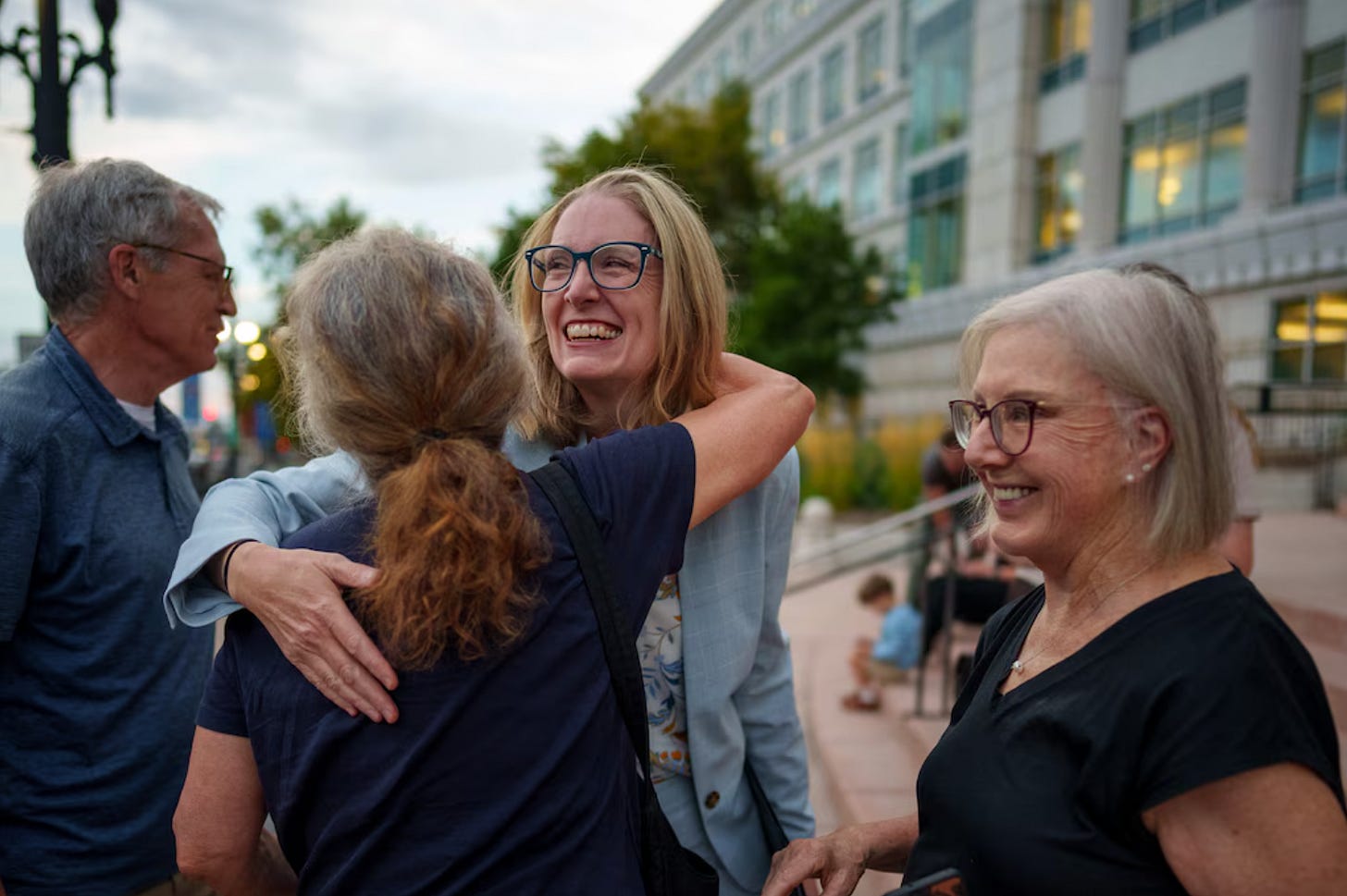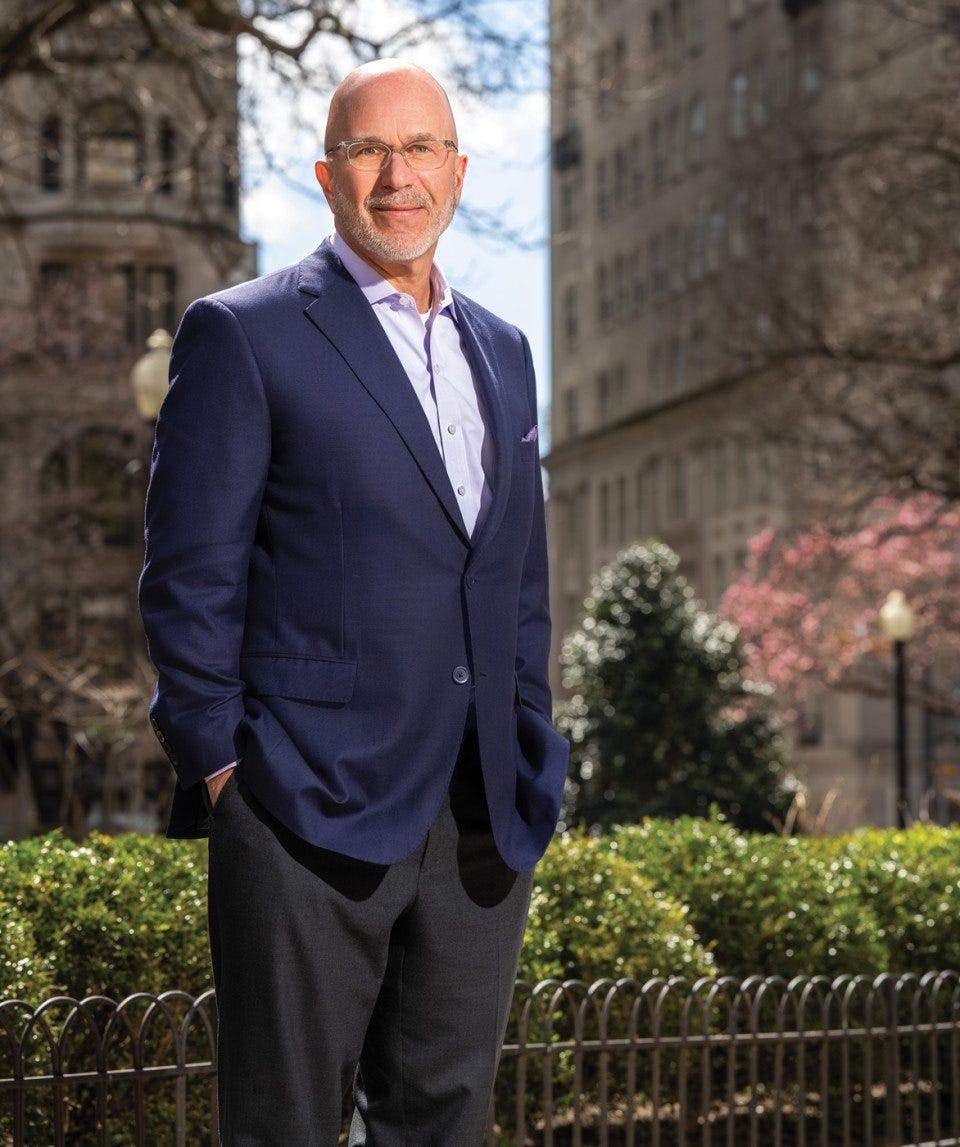The Voters Who Refuse to Surrender
Across the country, there are sparks of hope for democracy
As a sociologist, I spend a lot of time reading and thinking about an American electorate caught in a stress response. Freedom House and Brookings have documented a democratic decline in the USA, and I have to wonder what voters might do in this moment: fight, flee, or freeze?
No doubt a number of citizens feel paralyzed by the current state of political division and would prefer to ignore it. They have filled their social media feeds with videos of chickens wearing tiny shoes and spent their time studying the Kansas City Chiefs’ offense in support of Taylor’s fiancé. Still, political paralysis has not depressed the turnout rates of eligible voters, which in 2020 were at their highest since the early 1900s.
Others have decided it’s time to flee. The Association of American Universities has compiled a list of articles about scientists and researchers particularly impacted by the “brain drain” from academic institutions suffering significant budget crises. Ireland, China, Canada, Norway, Australia, and France are just a few of the countries actively recruiting America’s top research talent amid funding scarcity.
But those whose instinct is to fight to reform American democracy have set off tiny sparks across the nation. The evidence of these sparks is common enough in headlines that it begs the question: Have the most boring parts of the democratic process become the most galvanizing issue among voters?
Sparks spreading across the states
The "congressional arms race" of 2026 makes a compelling case that it’s time for a review of the United States’ voting processes. Citizens are realizing that an apathetic approach to voting will not be enough to preserve the great experiment of American democracy. Many are concerned that elections serve the powerful few more than the people at large, and they’re trying to change that.
As Texas, California, Missouri, Ohio, Florida, and Louisiana pursue congressional redistricting initiatives meant to advantage the candidates of a preferred political party, other states are in court trying to defend their own voter suppression tactics.
In late August, Judge Dianna M. Gibson of Utah’s Third District ordered the state legislature to draw new congressional maps. Legislators approved the current maps in 2021 after rejecting three possible maps proposed by the Utah Independent Redistricting Commission, which was created through a popular voter initiative but later reduced by the state legislature to merely an advisory role. Much of Salt Lake County, which previously made up the bulk of the state’s sole competitive congressional district, was divided into four separate districts to try to ensure that Utah’s entire House delegation would be safely Republican.
Members of Utah’s League of Women Voters and Mormon Women for Ethical Government filed a lawsuit arguing that, by disregarding the independent commission, the legislature had violated the state constitution’s provision allowing voter initiatives. Judge Gibson agreed, and her opinion explained the significance of the case:“Redistricting is not a mere exercise in political line-drawing; it strikes at the very heart of our democracy… Redistricting is among the most critical responsibilities of our government because it ultimately defines how fully people’s voices are heard in the institutions that govern them,” she wrote in her 79-page opinion.
In a phone interview, Emma Petty Addams, co–executive director of Mormon Women for Ethical Government, said her group “has members in all 50 states who are very interested in what it looks like to politically innovate and come together in ways that diminish the partisan warfare hurting us all. It’s one thing to have a win for yourself — it’s another thing to have a collective win. We are witnessing the best of what democracy can offer.”

Voters in New York City have been working to make their voice heard as well. Late last year, Mayor Eric Adams convened a 13-member commission to consider revisions to the city’s charter that would be put before voters this fall. The commission was meant to focus on housing insecurity, but it received so many comments from independent voters who are blocked from the city’s closed primaries that it considered adding an initiative to open NYC primary elections. (In a closed primary, you have to belong to a major political party in order to vote. In an open primary, any registered voter can cast a ballot.)
In Pennsylvania, four voters (including Michael Smerconish of CNN) recently filed a lawsuit against their state, claiming that closed primaries are a violation of voter rights. “If you can’t vote in the primary election in Pennsylvania, your vote doesn’t matter,” said David Thornburgh, the former CEO of the Committee of Seventy good-government organization. “And that’s a sad comment on our state of affairs.”
A similar lawsuit was filed in Oregon in June, with the plaintiffs arguing that the state constitution does not require voters to claim a certain political party in order to register to vote, despite state statutes to the contrary.
A Maryland court will also have to make a decision on the constitutionality of closed primaries, after five unaffiliated voters legally represented by former Lt. Gov. Boyd Rutherford filed a lawsuit in May.
In Wyoming, voters are in a legal tangle with the state to challenge recent legislation that restricts the forms of documentation accepted in voter registration.
I called Cathy Stewart of Open Primaries to ask about the political trends catching her eye as someone who has advocated since the 1980s for independent voters to have ballot access.
She noted that independents are severely under-researched, and there is much mythology about who they are and what they believe. Even so, a 2025 Gallup poll revealed that independent voters are holding at 43% of the US electorate for the third year in a row.
“The number of independent voters becomes something other than a statistic when you start to see those voters testifying against bills in real life,” Stewart said. “People are starting to recognize that in order to make democracy more fair, you have to change the system. I am working to make these voters more visible so that they are harder to ignore.”
The legal victories in some states for voter access and independent redistricting clash sharply with a news cycle full of gerrymandering schemes in other states. Both Ms. Stewart and Ms. Addams of Utah emphasize that this is not an accidental irony. The courtroom victories are the result of patient coalition-building by people frustrated with the system.
Ms. Addams believes that anything worth doing is worth doing over a period of time. “In an age of social media activism,” she said, “we want to have quick wins, but durable wins require principled persistence. The more you can do the long, slow, hard work to persuade people to come along with you, the more durable your win will be in the long term.”
She continued: “Durable wins require building relationships with legislators and people in power. The relationship-building and the act of identifying your principles and then working hard to act in accordance with them, in and of itself, is a democratic act. This is the purest form of ‘little d democracy’ — the coalitions and relationships and muscles you are building are what strengthen the fabric of our society.”








Thank you, Lauren, for sharing good and important news. I can report that here in MO, against the protests of thousands of us in our state Capitol, our legislature did pass an (in my opinion) illegal gerrymandered voting map last week. But the good news is that we have a mechanism in our state constitution that allows us to gather signatures on a citizens’ veto petition. Of course, I will be doing that!
The awful truth is that in the same session, our legislature also passed a bill to sabotage our state constitutional right for citizens to pass laws by petition. Fortunately, because it’s overturning a state constitutional amendment, it must be voted on by the citizens. You would think people wouldn’t vote to give up their rights, but because the legislature uses deceptive language (lies!), it has happened before! It is up to us to educate voters and get them to the polls.
Lauren is so right about people that are totally invested in Taylor and Travis, but willfully ignore the destruction of their rights. Here in Missouri, our R supermajority is hell-bent on taking away every lever of control the people have over it. That’s why I’m here sparking hard to build coalitions that will last. Go League of Women Voters! Go Mormon Women!
Wonderful piece! Happy to have Utah’s gerrymandering journey shared on such a large platform. Living in Utah has been extremely frustrating. It doesn’t feel like we are properly represented.